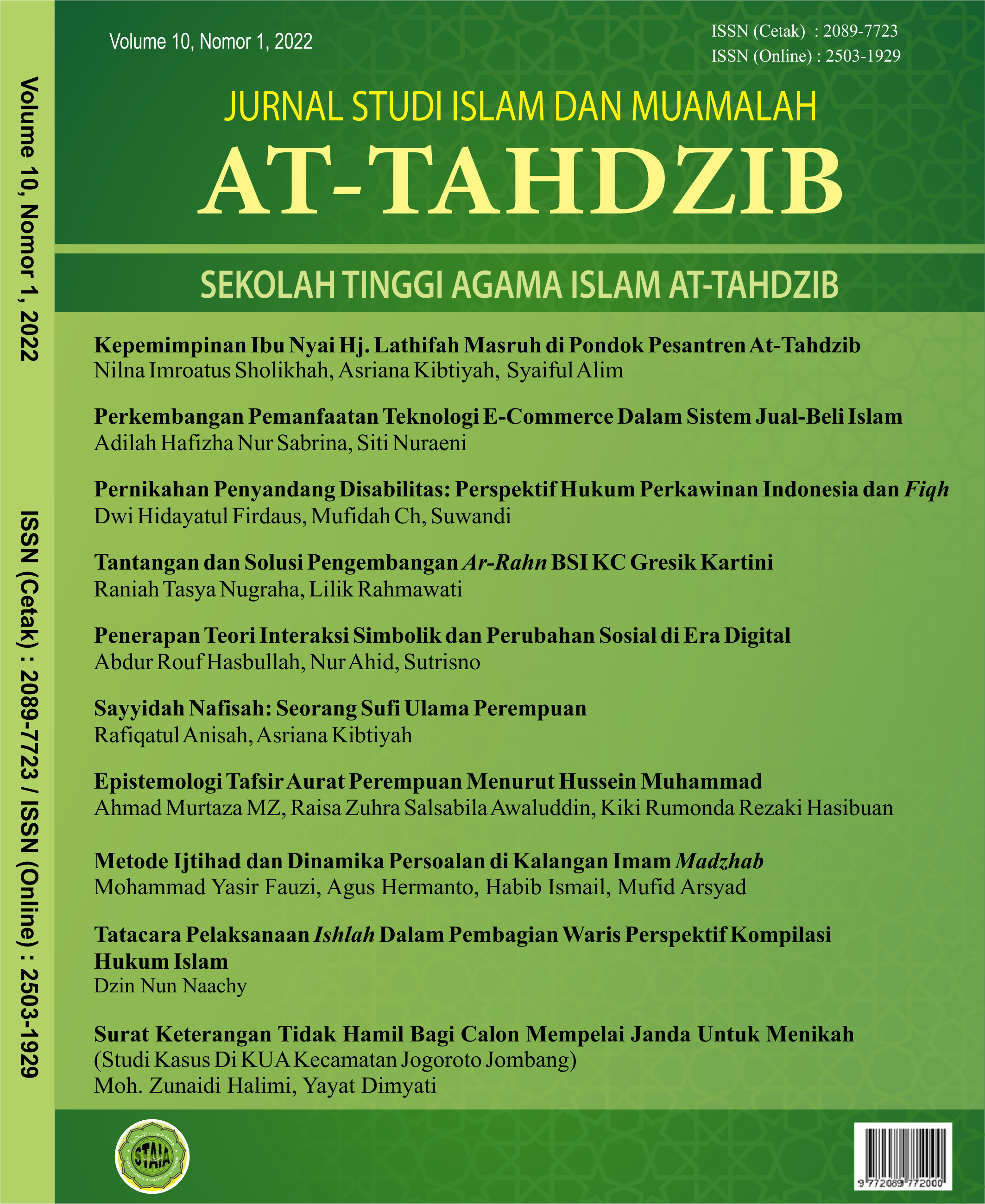Pernikahan Penyandang Disabilitas Perspektif Hukum Perkawinan Indonesia Dan Fiqh
Abstract
Background. Marriage is a lawful and main way to realize and maintain human honor, because by marrying people can avoid behaviors that are forbidden by Allah SWT. As normal human beings in their human instincts, persons with disabilities are also gifted with sexual desire and the desire to continue their offspring in a grand procession called marriage. However, with the various shortcomings that exist in them, they are worried that they will have difficulty in carrying out the life of the ark of their household life.
Aim. For this reason, it is necessary to know how marriages carried out by persons with disabilities are in the eyes of legislation and Islamic law, and this requires legal certainty.
Methods. This literatur study purpose to determine and analyze: Marriage Law for Persons with Mental Disabilities according to Law No. 1 of 1974 and Law no. 8 of 2016. This research method uses library research methods, namely research that collects data and information with the help of various materials contained in the literature.
Results. The results of this study are that legally, marriages for people with mental disabilities are still legal in terms of harmony and there is no damage or there must be an annulment in terms of the terms of marriage. Because for people with mental disabilities, whether prospective brides or grooms, there are no criteria, they must be healthy and respond to the needs of contemporary life such as human rights, gender, environment, democracy and others.
References
Afiyanah,Yayuk. (2020). Hukum perkawinan bagi penyandang disabilitas mental menurut Undang-Undang No. 1 Tahun 1974 dan Undang-Undang No. 8 Tahun 2016. Jurnal Syntax Admiration, 1. 7, 991-1003.
Al-Gazali, Abu Hamid. (1992). Al-Mustasfa, Madinah Munawwara: Islamic University.
Al-Shatibi, (2002). Al Muwafaqat fi usul al shariah, Beirut, Dar al Kutub al Arabi.
As Suyuthi, Al Asybah Wan Nadzair, al Maktabah as Syamila, Juz 1.
Audah, Jasser. (2008). Maqasid al-Shariah as Philosophy of Islamic Law: A Systems Approach, London, The International Institute of Islamic Tought.
Departemen Pendidikan Nasional. (2008). Kamus Besar Bahasa Indonesia Edisi Keempat. Jakarta: Gramedia.
Friedman, Lawrence M. (2009). Sistem hukum perspektif ilmu sosial, Bandung: Nusamedia.
https://kemensos.go.id/kemensos-dorong-aksesibilitas-informasi-ramah-penyandang-disabilitas#. Diakses 14 Januari 2022
Husna, Sarmidi. (2021). Fiqih penguatan penyandang Disabilitas. Tim Lembaga Bahtsul Masail (LBM) PBNU, 82.
Ibnu Hajaral-Haitsami, Tuhfah al Muhtaj fi Syarh al Minhaj, Beirut, Darul Ihya` at-Turatsal-Islami.
Izz al Din bin Abd al salam, Qawa‘id al ahkam fi masalih al anam.
Jalal al-din al-suyuti, al-ashbah wa al-nazair, Beirut, Dar al-fikr.
Kamal, Mukhtar. (2004). Asas-asas hukum Islam tentang perkawinan, Jakarta: Bulan Bintang.
Muhammad Said Ramadan al-Buti, Dawabit al-maslahah fi al-shariah al-islamiyyah, Muassasah al-risalah.
Peter Coleridge, Pembebasan dan pembangunan: Perjuangan penyandang cacat di negara-negara berkembang, Yogyakarta, Pustaka Pelajar, 2007, h.132.
Priyanti, Neng. (2018). Representation of people with disabilities in an Indonesian newspaper: A critical discourse analysis, Disability Studies Quarterly, 38, 4, DOI:10.18061/dsq.v38i4.5818
Riyadi, Eko. (2012). Vulnerable groups; Kajian dan mekanisme perlindungannya, Yogyakarta, UII PUSHAM.
Simatupang, Taufik H. (2019). Mendudukkan konsep executive review dalam sistem hukum ketatanegaraan Indonesia. De Jure, 19, 2. 218.
Sodiqin, Ali. (2021). Ambigiusitas perlindungan hukum penyandang disabilitas dalam perundang-undangan di Indonesia, Jurnal Legislasi Indonesia, 18(1), 31-44.
Soemantri, T. Sutjihati. (2006). Psikologi anak luar biasa. Bandung, Refika Aditama.
Tajuddin Assubki, al-Asybah Wannadzair, Dar al-Kutub al-`ilmiyah, cetakan pertama, .th. 1411H. II.
Umar bin Salih bin Umar, Maqashid al shari’ah ‘inda al Imam al Izz bin ‘Abd al-Salam.
Undang-Undang Republik Indonesia Nomor 1 Tahun 1974 Tentang Perkawinan Pasal 1.
Undang-Undang Republik Indonesia Nomor 8 Tahun 2016 Tentang Disabilitas Pasal 4 Ayat (2)
Utami, Risnawati., & Nugroho, Sapto. (2005). Meretas siklus kecacatan-realitas yang terabaikan. Surakarta:Yayasan Talenta.
Warsiki, Endang dkk. (2003). Hubungan antara kecacatan fisik anak dan depresi ibu dari anak-anak Tuna Daksa. Surabaya: YPAC.
Widinarsih, Dini (2019). Penyandang disabilitas di Indonesia: Perkembangan istilah dan definisi, Jurnal Ilmu Kesehatan Sosial, 20, 2, 127-142.
Yusuf, Ali. Fiqih difabel, https://tarjih.or.id/wp-content/uploads/2021/01/Fikih-Difabel.pdf. Diakses 25 Januari, 2022.
Copyright (c) 2022 At-Tahdzib: Jurnal Studi Islam dan Muamalah

This work is licensed under a Creative Commons Attribution 4.0 International License.

Jurnal Studi Islam by At-Tahdzib is licensed under a Creative Commons Attribution 4.0 International License.
Based on a work at http://ejournal.kopertais4.or.id/mataraman/index.php/tahdzib

